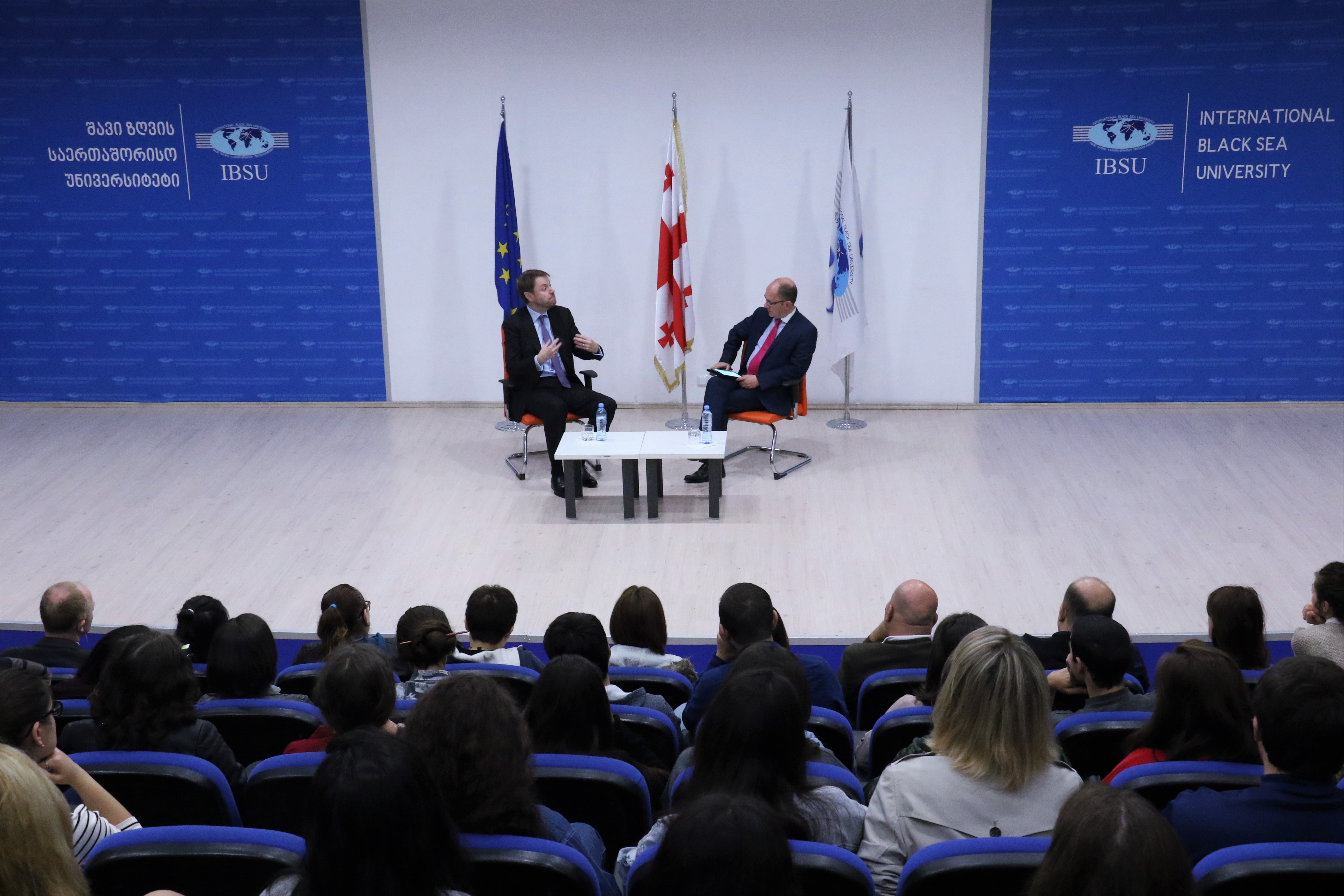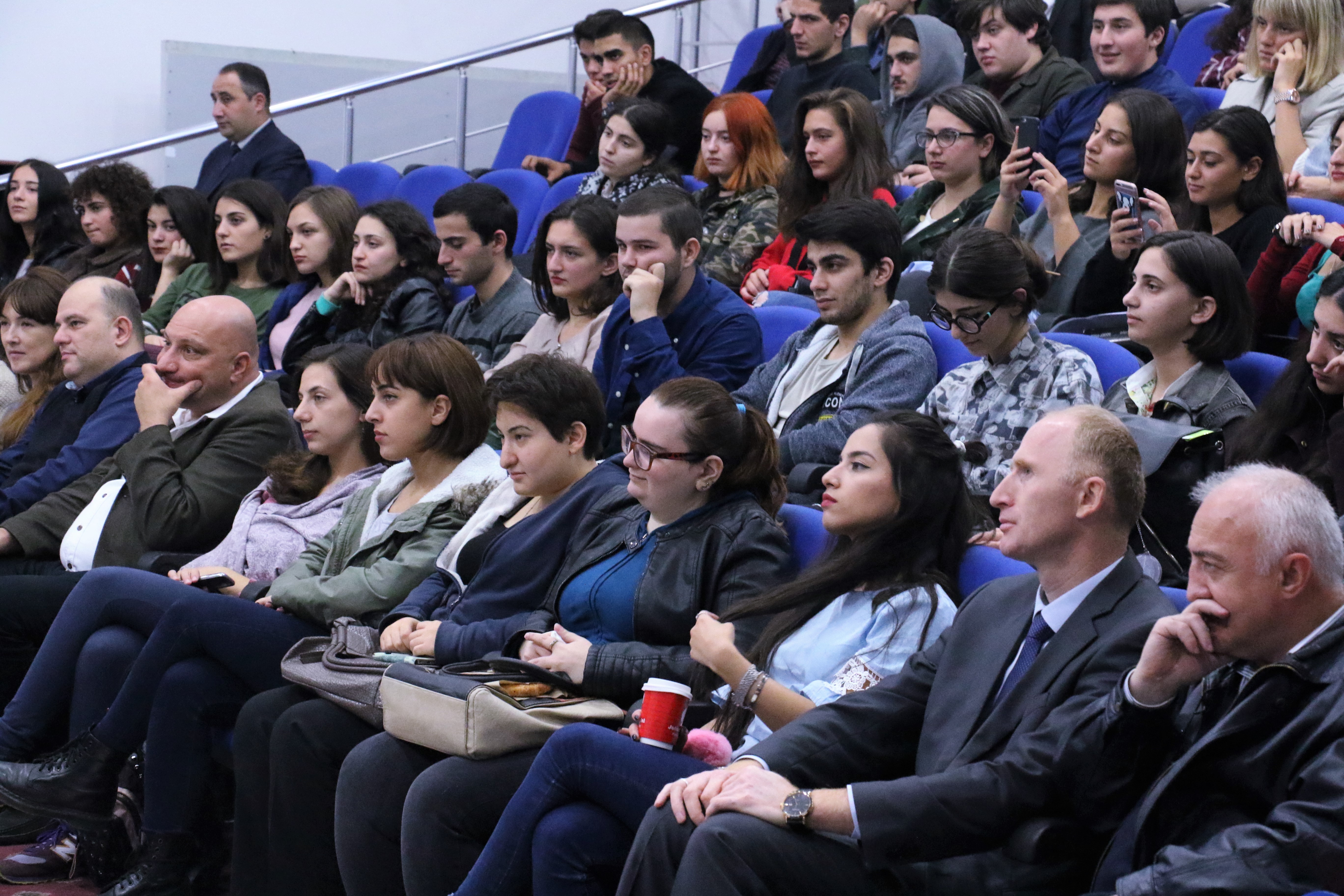British Ambassador on the Long History of Georgia-UK Relations
Exclusive Interview
As the United Kingdom and Georgia are celebrating 25 years since the restoration of diplomatic relations, and as her majesty’s government was one of the first western powers to recognize the fledging Georgian state in 2018, GEORGIA TODAY and Panorama TV Show approached British Ambassador Justin Mackenzie Smith for an exclusive interview during his tenure at the International Black Sea University, before a massive audience of students and academic staff.
What are the cornerstones of Georgian-British relations?
We’re celebrating 25 years since the reestablishment of diplomatic relations between Britain and Georgia but our relationship goes back much further. Britain was among the countries which recognized Georgia’s independence in 1919 during the first Georgian Republic. And there are traces of our friendship which go back further to the 19th century and before. Today, in our “modern friendship,” there are three main pillars. First, we have a strong relationship regarding issues of stability. Britain strongly supports Georgia’s sovereignty and territorial integrity and is supporting the Georgian people and Georgian government to reestablish both. We have a relationship on issues of resilience: helping to develop democratic institutions within Georgian society, be they in government, parliament, or society as a whole. And thirdly, what I am seeing after one year in Georgia are some very exciting people-to-people connections. In the education sphere, in culture, in sport, in rugby as well.
Tell us about the role that the UK played in handing the Lore-Tashir territories to Armenians.
If you’ll forgive me, I’d rather not comment on that [laughing]. This is a subject for another study of our historic relationship in that fascinating period between 1918-21. What I do remember is the role played by Sir Oliver Wardrop who was British Commissioner to the Transcaucasus at that time and who made great efforts in delivering recognition of Georgia’s independence. Britain stood by Georgia then and I would say Britain is standing by Georgia today.
The state websites of the Cayman Islands, under British autonomy, were found to have listed Abkhazia and South Ossetia as independent countries.
All I would say is that the British government is 100% clear that we do not recognize the breakaway territories of Abkhazia and South Ossetia. We strongly support Georgia’s sovereignty and territorial integrity; we have made it clear internationally throughout the last 25 years.
Brexit came as quite a shock for Georgians, with membership a coveted goal for our country. What lessons and conclusions do you think Georgians should draw from it?
Brexit means we are leaving the EU but it does not mean we are leaving Europe. We cannot leave Europe. We are a European country by geography, by history, by culture, by psychology. We are leaving the EU but not NATO. We will remain a leading country in NATO, which is the cornerstone of Euro-Atlantic security. Nor are we leaving the UN where we have a permanent seat on the Security Council. It is a decision about the relationship between the British population and the EU, not about the relationship between the British population and the wider world. What it also does not mean is that we will stop supporting Georgia or Georgia’s ambitions to integrate with the EU or Euro-Atlantic institutions. Why? The answer is because we understand that ambition as an ambition to express European values. Those are values which we share in the UK: they’re about democracy, open and transparent societies, prosperity, and so on.
What about the current wave of independence referedums? Catalonia pulled off what Scotland couldn't. Do you think it might inspire them to another try?
Well, I’m Scottish and I would say one thing about the Scots: we tend to make up our own minds and decisions, for good or for bad. So far as events in Catalonia are concerned, PM Teresa May spoke with PM Rajoy and made clear that we support the upholding of the Spanish Constitution. That is the critical thing here: all our actions must be taken in accordance with the Spanish Constitution. As for Scotland, the SNP, which makes up the Scottish government, is having its annual conference and these exact issues are under discussion. For a percentage of the population, the ambition of independence has not gone away. However, we had a referendum in 2015, the year before the EU referendum, and the majority decided to remain in the UK. That is the view of the majority and we in democratic, open and transparent society abide by the decision of the majority. And that is where we are today. Where we will be in 5, 10 years’ time, who knows?
What is the balance between self-determination and territorial integrity?
We start from the position of total support of Georgia’s sovereignty and territorial integrity. We’d like to help to find the solution. We believe the current status quo is not in Georgia’s interests. Things are going backwards in our assessment and we feel it important to continue to support efforts to find the way forward. We support this and previous Georgian governments’ initiatives internationally to draw attention to the unacceptable infringement of Georgia’s territorial integrity within its own borders in the UN, OSCE and other forums. We also play a part in the EUMM which, on a daily basis, monitors the situation at the ABL between these communities. Like many in Georgia, we believe that we must keep dialogue ongoing across these dividing lines because only through dialogue can a long-term solution can be found. And we do have expertise from our own experience in Northern Ireland and elsewhere in the world which we share with our Georgian friends.
One of your previous posts was overseeing UK-Russia relations. What is your advice to Georgians in dealing with Russia?
I don’t think the Georgian authorities need any advice from me on dealing with Russia. [laughs]. We are very supportive of the Abashidze-Karasin process, for example, as a way of keeping the dialogue ongoing on practical issues. But we understand how fundamentally difficult it is for the Georgian government and society to engage with Russia while Georgia’s territorial integrity and sovereignty is infringed, partly as a result of the actions of Russia. We have our own problems with Russia as well, let’s be honest. Just as with Georgia, we strongly take issue with the consequences of Russia’s actions in Ukraine. But we continue to believe that a way forward only can be found through some kind of dialogue. And we also continue to believe that Russia is much more than its government. There are strong historical links between the British and the Russian people, just as there are very strong historical links between the Georgian and the Russian people and we must not lose sight of those connections as we think about the long-term future of our relationship.
You’ve been here one year and speak and understand Georgian. What’s your take on the country?
I love this country. I feel very lucky to be here as Her Majesty’s Ambassador to Georgia. It is a voyage of discovery for me. I’m still finding out about Georgian history, society, contemporary Georgian culture and I think there will be more than enough to satisfy me for the next few years. I’m enjoying being surrounded by the energy of “young Georgia”. With no disrespect to old Georgia, I have many “old Georgian” friends. But young Georgia, post-independence Georgia, is a new society and I think there’s real energy and dynamism and potential among young Georgians. And I see that every day. If that’s the way that I, as Ambassador, or we, as the British Embassy, can help support the development of young Georgia, I’ll be very happy.
Vazha Tavberidze












